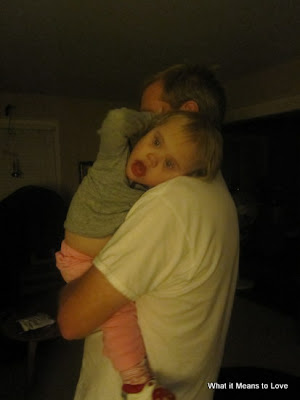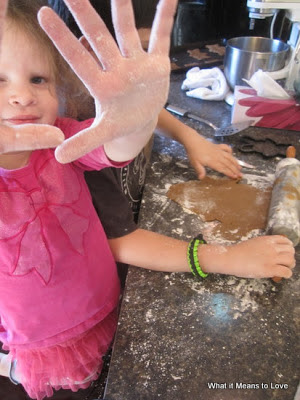Today an article popped up on my Facebook feed.
Intrigued, especially since it was posted by someone in one of my Lyme support groups instead of a by special needs adoptive mama, I clicked and started to read it.
It's worth the read and it teaches such an important lesson, for everyone, not just parents.
And it reminded me of something that happened a couple weeks ago.
But before I tell you that story you need to go read it.
When Your Kid Sees a Disabled Person at the Grocery Store
Done? Read it all the way through? No? Go finish.
Now are you all done? Okay.
So a couple weeks ago, I was at one of our local Farmer's Markets, selling
the items Rachel and I have made to find Maria a family.
A lady came up with her son, who was probably 5 or 6 years old. They decided to buy a hat.
While she was standing there getting the money out of her wallet, her son was standing next to her, in front of the pile of business cards I had sitting on the table. He was looking at it.
And then he points to Owen's picture and says "Mom, he looks like an alien."
My heart hurt inside, but I pretended I didn't hear and waited to see what his mom would say.
I was disappointed, for the reasons stated so beautifully in the article above, when she only shushed him and whispered that wasn't very nice.
I couldn't let it go, so I used the opportunity, and spoke to the boy.
"His name is Owen. He's not an alien, God just made his head a little different than yours. When he was a baby he didn't have doctors to help fix the shape of his head, and now he's growing up with it still that shape."
His mom, seeming a little ashamed, jumped on board to help me explain. "Remember how your cousin Jacob had a head shaped a little different and had to wear a helmet so it would be the right shape again?"
Happy that she was helping instead of trying to get her son away from me and my "crazy ideas", I continued. "Owen doesn't have a mommy and daddy like Jacob does to bring him to the doctor and get him a helmet to fix his head."
He looked up to his mom, who nodded in agreement.
I kept going. "Some kids don't have a mommy or daddy to love them, to play with them, or give them hugs and kisses. Isn't that sad?"
He nodded his head and said "yeah", still trying to process what I had just told him. His mom smiled at me and they walked away.
++++++++++++++++
That exchange had me thinking the rest of the day. And I realized something else besides just what the article stated, and it's kinda off topic, but still wanted to add it.
The orphan crisis really is as simple as I explained it that boy. We need to see it through the eyes of a child, and be upset like a child would.
Children don't see the big picture, because they don't understand the numbers. They aren't hearing about the bad adoption experiences on the news, nor do they have firm views that they were taught growing up - their minds are open to new ideas much more easily than adults are.
They hear about the problem and do what they can to make a difference, one child at a time.
That's how we need to approach the orphan crisis. With the mind of a child.
++++++++++++++++
Something else, which kinda contradicting to the link I shared above.
I know several moms who it bothers big time when people stare at their children who look a little different.
So maybe if your child is staring, first redirect their gaze gently, but don't just tell them not to stare. Explain that God made that child or person a little bit different than everyone else, but they are should be treated like everyone else. If you know what their special need is, explain that.
Let your child ask questions and don't just tell them that's not nice. And if your child has questions you can't answer, go up to the person or parent of the person and ask respectfully. "My child is curious to know why she/he/your daughter/your son looks a little bit different than everyone else, would you mind explaining to them?"
And if there is an opportunity to lend a helping hand when
they need it, by all means, do it, and let your child help too. Such as helping them up if they fall.
I think what bothers the moms who don't like people staring at their kids the most, is that the parents don't anything about it, not so much the fact the kids are doing it. That the parents didn't teach them when they were young and use every opportunity to reinforce it. If your kid stares and asks a question, but you use that opportunity to teach your child right then and there, they will appreciate that.















.jpg)
























